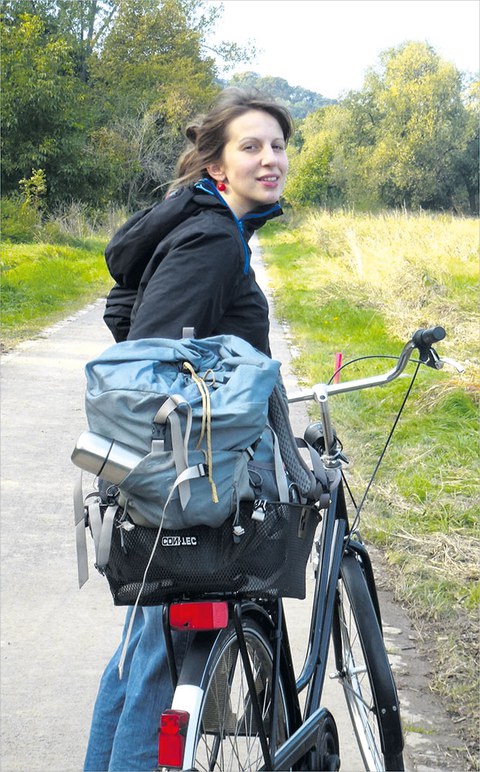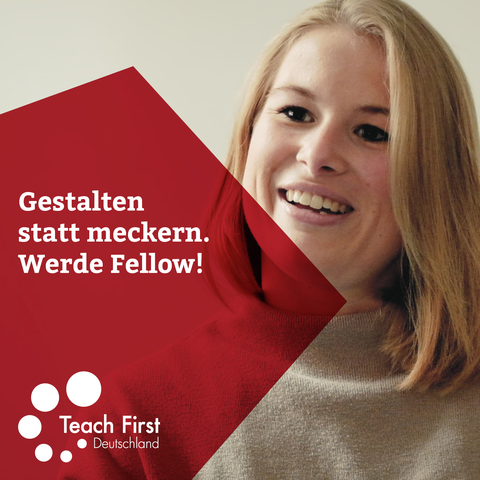Committed to Educational Equity
(Interviewed in 2018)
Claudia Kallmeier
Germany needs greater educational equity. In disenfranchised communities, students often do not have the same opportunities after finishing school as those from more privileged areas. For ten years now, the non-profit organization Teach First has actively supported children and youth in schools. TUD alumna Teresa Wilmes was a Teach First fellow at a school affected by educational inequity.

Teresa Wilmes
The idea is simple—university graduates work as fellows at a school for two years. Through targeted support in lessons and other measures, these fellows help pupils overcome hurdles in the education system and disadvantages they face on account of their social background. Really, this should be a question of policy. “That’s true,” says Teresa Wilmes, “but not enough is happening at the political level.” The TU Dresden alumna worked as a Teach First fellow until last summer. After completing her bachelor’s degree in International Relations, she decided to gather some practical experience before continuing with her master’s. She initially learned about Teach First from a friend. “It became clear to me during my studies how privileged I am and how many outside factors influence this,” the 27-year-old explains. “I liked Teach First because it offered me a glimpse into the school system without being a permanent part of it.”
Teresa Wilmes is originally from Duisburg. She wasn’t expecting her fellowship to lead her back there after her studies in Dresden, but it was a welcome surprise. The high school (Gymnasium) that she worked at is in Marxloh—a quarter not too far from where she grew up, and yet worlds away. Marxloh is what many would consider an underprivileged district, and crime rates are high.
The neighborhood has a very diverse population, and about 90 percent of the pupils at the high school or their families come from another country. The school offers international preparatory courses, which are intended to facilitate the transition for the children and youth who have just arrived in Germany. This was Teresa Wilmes’s primary assignment. “The key focus is language acquisition. The objective is for all of the students to become proficient enough in German that they can eventually switch to general education classes.”

Young people who want to effect change in society and ensure children their fair chance can apply to work with Teach First Deutschland.
The program is not perfect, as Teresa Wilmes quickly found out. “Separating the students from the general education classes actually hinders integration and robs the children and youth of many future prospects,” she says. “This inhibits educational opportunities and perpetuates prejudices.” What’s more, there is no set curriculum for the international classes, and the teachers often have to accommodate drastically different levels of learning within a single group. Despite the challenges, Teresa Wilmes wouldn’t have done things differently. “I’ve really grown as a person,” she says. “I had to relearn everything I thought I knew. But now I know that I was able to make a big difference on a small scale—that I was there for the children and was able to offer them valuable support.” The school’s administration was receptive to new ideas, so she had a certain leeway to try things out and learn from her mistakes. “I now understand a lot more—for example, that many problems are deeply rooted in the structures in place. And I have also learned to take things in a different direction and to find allies to support my endeavors.” After two years as a Fellow at the school, Teresa Wilmes is certain that her future lies in educational justice. She has moved to London to complete a master’s degree in Education and International Development.
Update 2021:
Teresa Wilmes has acquired her master’s degree in Education and International Development from University College London’s Institute of Education and now works for the children’s rights organization terre des hommes in Germany. She coordinates projects and assists partner organizations with matters of self-organization of youth, participation and education for refugee children and youth. Outside of her job, she is also involved in the political development of educational issues.
